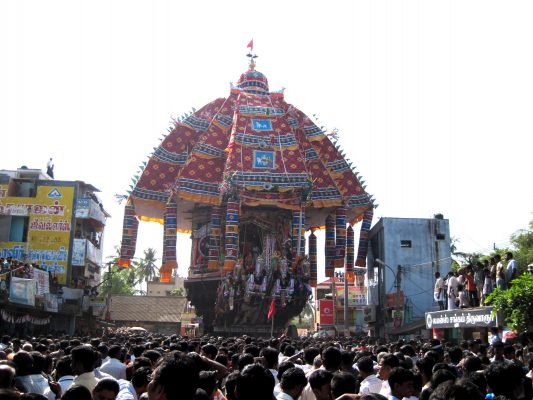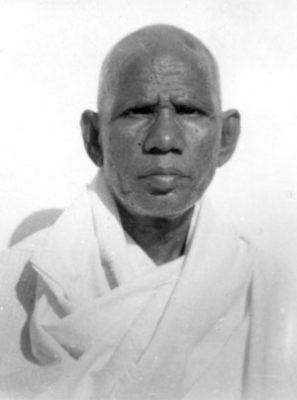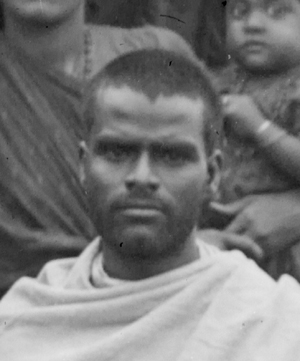Kumaradeva accepted the order and went on to compose sixteen jnana sastras. In one portion of the sixth sastra – which is entitled Jnana Ammanai and is addressed to the deities of Vriddhachalam who enabled him to compose the work – he gave details of his life and his spiritual development. The lines all conclude with the exclamation ‘ammanai!’ This is a celebratory shout that indicates joy and delight in all the incidents and opinions that are mentioned in the poem. The original ammanai poem was composed by Manikkavachagar in Tiruvannamalai over a thousand years ago. The ammanai exclamation in that particular poem is thought to be derived from a triumphant shout of joy made by young girls as they collectively played a long-forgotten game of that era.
Here, then, is an extract from Kumaradeva’s own ammanai poem, his exultant retelling of his path to liberation:
Worshipping the feet of Azhattu Pillaiyar – ammanai!
I rooted out doubt and erroneous understanding – ammanai!
Reaching the feet of Vriddhambhikai – ammanai!
opening the eye of true jnana – ammanai!
and meditating and dwelling on the conclusion – ammanai!
I will now declare what I have experienced, as I experienced it – ammanai!
Azhattu Pillaiyar is the name of Ganapati at Vriddhachalam, while Vriddhambhikai is Siva’s consort there.
Father, mother, wife, relations – ammanai!
these are attachments of the soul – ammanai!
Wealth, ornaments, land, empire – ammanai!
these are attachments to objects – ammanai!
These two are external attachments – ammanai!
Remaining with these – ammanai!
thinking there is no lack in – ammanai!
noble lineage, wealth, handsome looks, attire – ammanai!
I lived for some time, wallowing in them – ammanai!
without paying attention to the excellent path – ammanai!
not performing Siva bhakti, tapas, and offering gifts – ammanai!
It was through providence that my mind became clear – ammanai!
Impermanent, impure and misery-causing – ammanai!
maya of this nature is most certainly unreal – ammanai!
Eternal, immaculate and having enduring bliss – ammanai!
this state of liberation is one’s own [state] and real – ammanai!
After realising this, disregarding completely – ammanai!
the happiness of a householder’s life – ammanai!
I renounced it in my youth as false and moved towards – ammanai!
the golden feet of jnana Guru Santalinga – ammanai!
I came, I praised him, and I prostrated – ammanai!
He placed his golden feet on my head and then – ammanai!
made clear to me the path of liberation – ammanai!
He said, ‘Exert yourself on tapas at Vriddhachalam’ – ammanai!
Obeying his command I stayed there – ammanai!
remaining there motionless, night and day – ammanai!
I merged in tapas – ammanai!
Vriddhambhikai came and taught me – ammanai!
As she was explaining I realised – ammanai!
clearly the experience that is free from doubt and wrong understanding – ammanai!(Jnana Ammanai, sixth sastra, lines 1-34)
Seeing everything as ‘I’ – ammanai!
I remained without any anxiety – ammanai!
Only my being manifests and exists – ammanai!
only my consciousness appears – ammanai!
only my bliss is experienced as happiness – ammanai!
all is only sat-chit-ananda – ammanai!
I saw and attained myself through myself – ammanai!
I remained, experiencing happiness alone – ammanai!
I became convinced that the happiness experienced in objects – ammanai!
is only my own bliss – ammanai!
From now on I will not think of or desire any object – ammanai!
There is no bliss in it – ammanai!
I obtained freedom from desire and fear – ammanai!
as I became the eternal blissful one – ammanai!
Whatever happens to come to me in the present – ammanai!
I will experience it in a state of desirelessness and abide in the [natural] state – ammanai!
When I think, I see myself as ‘this’ – ammanai!
as the various non-existent objects – ammanai!
In my thought-free state I am only myself as One – ammanai!
Seeing only myself here and there – ammanai!
I remain without any anxiety… – ammanai!(Jnana Ammanai, sixth sastra, lines 67-88)
There is nothing other than ‘me’. I swear to this – ammanai!
I will hold the red-hot iron in my hand [swearing] that this is the truth – ammanai!
Not knowing myself for such a long time – ammanai!
was like languishing in fear, without knowing my way – ammanai!
What recompense can there be in me – ammanai!
for the compassion of Sankari [the consort of Siva], who has no equal – ammanai!
that bestowed her cool grace? – ammanai!
From now on it will be proper for me to render elegant service – ammanai!
wholeheartedly to her devotees – ammanai!
May this holy kshetra of Vriddhachalam shine forth – ammanai!(Jnana Ammanai, sixth sastra, lines 91-100)
Though Kumaradeva’s written works are studied in Vedanta maths, he himself was brought up in the Virasaiva tradition. This is a subdivision of the Saiva faith which originated in Karnataka about 800 years ago. It still has many adherents there. The traditional accounts of Kumaradeva’s life stress his Virasaiva background and beliefs and generally include the following entertaining incident:
Once Kumaradeva went to Tiruvarur to witness its annual festival. As Sri Tyagaraja, the presiding deity of Tiruvarur, was travelling in his chariot, moving through the main streets that surrounded the temple, Kumaradeva stood in front of the moving vehicle and had darshan of the deity.

Two Saivas who witnessed this spoke to each other in a sneering way: ‘Look at this deluded Virasaiva!’
The implication in the original Tamil is not that Kumaradeva is a deluded person, but that the Virasaiva faith is based on deluded principles.
When he overheard this comment, Kumaradeva addressed Thyagaraja: ‘Lord, if the Virasaiva faith is a delusion, then let this chariot continue. If it is the way of grace, then let this chariot come to a halt.’
The chariot ground to a halt.
After issuing this challenge and achieving the desired result, Kumaradeva went and sat under the shade of a nearby tree.
The king of Thanjavur, who was also a trustee of the temple, learned that the chariot had unexpectedly stopped. Since he had taken a vow that he would not eat until the chariot had returned to its starting point, he became extremely concerned and initiated several different attempts to get the chariot to continue. The chariot, though, refused to budge from its spot.
Feeling both anxious and exhausted by his failure, he prayed, ‘Lord, what can be done now? Through whose agency has this event occurred? My vow is not possible to fulfil.’
The king then learned about the incident between Kumaradeva and the taunting Saivas which had occurred earlier that day.
He went to Kumaradeva, prostrated to him, and appealed to him for help. Kumaradeva, though, was unmoved.
He told the king, ‘What business do you have with this “deluded” person? Go away!’
The king persisted by both praising and beseeching him, adding, ‘You should forgive this fault of ours and make the chariot move again’.
Kumaradeva finally agreed to help by taking up the matter with Sri Tyagaraja directly.
Accompanied by the king and his entourage, he stood before the chariot and addressed the deity: ‘If the Virasaiva faith is the way of grace, let this chariot move. If it is delusion, then let the chariot remain motionless.’
Immediately, and to the joy of everyone watching, the chariot began to move, reaching its starting point without any further problems.
The first jnana sastra that Kumaradeva composed under the supervision of Periyanayaki, was Maharaja Turavu (The Renunciation of a Great King). This later became a standard text on Vedanta in the Tamil-speaking world. It is one of sixteen Vedanta texts that comprise the syllabus in some traditional South Indian maths. Maharaja Turavu covers many topics but one of its principal themes is extolling the virtues of physical renunciation and ascetic living.
In Talks with Sri Ramana Maharshi, talk number 648, Bhagavan mentioned one of its verses with great approval:
In Maharaja Turavu [Kumaradeva writes that he] was seated on the bare ground, the earth was his seat, the wind was the chamara; the sky was the canopy; and renunciation was his spouse.
Then Sri Bhagavan continued:
I had no cloth spread on the floor in earlier days. I used to sit on the floor and lie on the ground. That is freedom. The sofa is a bondage. It is a gaol for me. I am not allowed to sit where and how I please. Is it not bondage? One must be free to do as one pleases, and should not be served by others.
‘No want’ is the greatest bliss. It can be realised only by experience. Even an emperor is no match for a man with no want. The emperor has got vassals under him. But the other man is not aware of anyone beside the Self. Which is better?
This is a free rendering of verse 64. The full translation is as follows:
The king remained resplendent with the earth as his bed, and the sky, appropriately, as his canopy. Existing in happiness as the one Self, the moon and the ruddy sun became his lamps, the wafting breeze his befitting yak-tail fan, and renunciation his wife.
Though the verses of Maharaja Turavu that praised an ascetic and frugal lifestyle clearly resonated with Bhagavan, he did not accept Kumaradeva’s contention, repeated in many of the verses, that physical renunciation was an essential prerequisite to Self-realisation. There is no record of Bhagavan ever giving permission to a devotee who wanted to give up his family or financial responsibilities in order to pursue a spiritual life full-time. If Bhagavan was asked about this, he would usually reply that it is the mind that has to be renounced, not physical circumstances, and that realisation did not depend on adopting a particular lifestyle.

Sadhu Natanananda (known in his earlier life as Natesa Mudaliar) was one of the devotees who sought Bhagavan’s permission to renounce family life and become a sannyasin. As a keen student of vedantic texts, Natananananda had probably read Maharaja Turavu and accepted Kumaradeva’s prescription that physical renunciation was a pre-requisite for serious seekers. This is why, in refusing his request (see the quote below) Bhagavan cited a typical renunciation verse from Maharaja Turavu before going on to point out that in later works Kumaradeva had changed his view and taught that renunciation of the ego was more important than the external variety. This is B. V. Narasimhaswami’s account of Bhagavan’s reply:
[Around] 1926 Natesa Mudaliar approached Maharshi and said that he desired to become an ascetic, as that seemed the only course for him, since domestic life was standing in the way of his achieving peace and control of mind. Maharshi tried to dissuade him, and pointed out that if one quitted home to escape a single hindrance and went to the forest, ten hindrances would beset him there, as though they came up on purpose to test his mettle.
‘But do not ask me why I came,’ said Maharshi. ‘Somehow I came then.’
Bhagavan is saying here, ‘Do not ask me why I myself left my family and came to Tiruvannamalai. It is something that just happened.’ Also, the circumstances were different. Bhagavan did not leave to take up a life of spiritual practice in Tiruvannamalai. When he left Madurai in 1896, he was already fully enlightened. Bhagavan continued:
[Bhagavan then] quoted Maharaja Turavu [saying] that the king, when he left home and all, no doubt said, ‘If a man goes southward [from a starting point in South India] he will never go to the Ganges. Similarly, one who stays home will never obtain liberation.’
This is a paraphrase of verse 72 of Maharaja Turavu. The original verse reads:
Will those staying south of the Ganga reach the river and bathe in its holy waters if they walk southwards?… Similarly, those who remain as householders will not reach liberation.
Bhagavan continued:
But the same king at a later stage said that there was no difference between domestic life and a hermit’s.
‘Just as you are free from cares of home when you are here,’ said Maharshi, ‘go home and try to be unconcerned and unaffected even in the midst of home life.’
Natesa Mudaliar got the same negative reply on two or three later occasions when he again broached the subject of sannyasa. Maharshi’s words proved to be quite prophetic. Natesa Mudaliar, with an impetuosity which no doubt did credit to his heart, put on kashayam [orange robes] and became a sannyasi. But he was prevailed upon, after a few years, to resume his place as a householder and work for his family as a teacher in a school. (Self-Realization, 1993 ed., p. 224)

According to Kunju Swami, Natanananda asked Bhagavan to give him the orange robes of a sannyasin. Natanananda had brought the cloth to the old hall but Bhagavan refused to touch it. Natanananda then placed the cloth on the stool in front of Bhagavan that visitors put their offerings on. After a few minutes he took it away and began to wear it. A few months later, when Natanananda decided to give up his life as a sannyasin, he presented the orange robes to Bhagavan. For the rest of his life he only ever wore white clothes. (The Power of the Presence, part one, p. 97)
In his reply to Natanananda Bhagavan noted that Kumaradeva ‘at a later stage said that there was no difference between domestic life and a hermit’s’. This is most probably a reference to a sequence of verses in Advaita Unmai where Kumaradeva’s views are almost indistinguishable from those of Bhagavan.
81
There is no need to renounce everything. If karma leaves you, everything will leave [along with it]. If karma remains, they [objects] will associate with you. Give up clinging to them or renouncing them. Knowing that [these things manifest] according to your karma, exert yourself only to attain the firm knowledge ‘I am the Self’.
82
Even if those who are firmly convinced ‘I am the Self’ continue to remain as householders, they will lack nothing, and they will be free from all blemishes. Even if they renounce a householder’s life, will those who do not have the firm conviction ‘I am the Self’ attain liberation merely because of this [renunciation]? Will their births come to an end?
83
It is not appropriate to say that those who remain as householders will have to experience sorrow and delusion [soha and moha] and that for those who have renounced and become sannyasins, sorrow and delusion will leave. Sorrow and delusion will not end in those who do not know ‘I am the Self’. It will only end for those who have the knowledge ‘I am the Self’.
84
There is no need either to renounce this world or cling to it. It is enough for one to know that the world is an illusion. Instantly, it will leave. If it is asked, ‘What should be renounced and what should be clung to?’ the correct solution is to renounce jivatva – the feeling ‘I am a jiva’ – and instead hold tightly to Self-attention.
85
It is not necessary to think about choosing between a householder’s life and sannyasa. Neither is an obstacle. Self is attained by remaining motionless, excluding all thoughts except the thought of the one [Self]. The obstacle to merging with that Self state is the feeling ‘I am a householder’ or ‘I am a sannyasin’. Get rid of it.